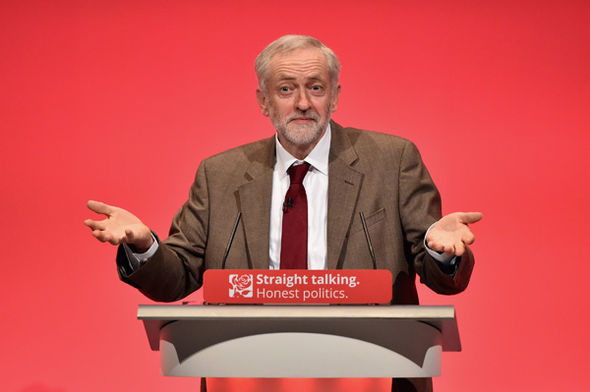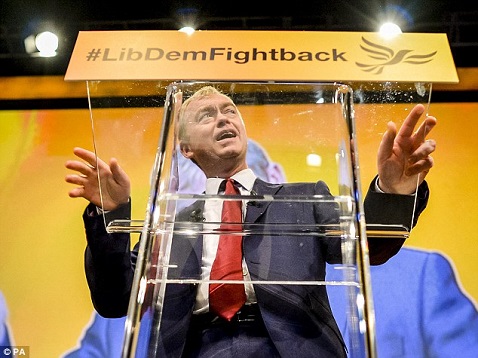
A few months ago, I argued that Labour leader Jeremy Corbyn had a tailor-made opportunity with the EU membership referendum. ![]()
Given that working-class Labour voters would be likely to determine the result, Corbyn could have shown that he has what it takes on the most crucial national referendum in decades. Most importantly, for a nervous set of Labour MPs warily eyeing a general election in 2020 or even sooner, it would show that Corbyn could actually win votes.
Corbyn, who fought a lonely fight in the 1970s and 1980s against Margaret Thatcher, then increasingly against his own party’s moderate ‘third way’ leadership in the 1990s and 2000s, was uniquely placed to win back those voters in northern England, many of whom supported Nigel Farage’s United Kingdom Independence Party (UKIP) in the 2015 general election. Of course, they are the voters who also voted so overwhelmingly to leave the European Union. Sadly, Corbyn had the kind of credibility that could have brought more working-class voters in Labour’s traditional northern heartlands to the Remain camp.
As it turns out, Labour supporters backed Remain by the considerable margin of 69% to 31%. But that 31% that supported Leave could have made the difference between failure and victory.
Today, as over 80% of the Labour Party’s MPs have delivered a vote of no confidence in Corbyn, and as Corbyn now faces — at minimum — a humiliating new leadership challenge, it’s clear that his lackluster performance in the ‘Brexit’ referendum has energized his opponents and caused even longtime supporters to reassess his ability or willingness to make the case to voters.
Yesterday, the head of the ‘Labour In’ campaign, former home secretary Alan Johnson (perhaps the only member of the ‘New Labour’ vanguard who retains a strong following in today’s Labour Party), charged that Corbyn essentially did the bare minimum for the Remain campaign, at times even working against Labour’s efforts. Corbyn, for example, refused to share a stage with either prime minister David Cameron or Liberal Democratic leader Tim Farron (and, though the idea was eventually nixed, Labour officials believed that not even a personal request from US president Barack Obama would have changed Corbyn’s famously stubborn mind).
Not even an impassioned plea from former prime minister Gordon Brown, appealing to the role that Great Britain played during World War II in standing up for European values, shifted enough recalcitrant Labour voters.

Liberal Democratic leader Tim Farron is already crusading to wage the next general election over restoring the United Kingdom’s membership in the European Union. But Corbyn has been mostly nonplussed about the referendum. Farron, for his part, angrily denounced Corbyn in the aftermath of the referendum, calling the Labour leader ‘spineless,’ accusing him of sitting on the fence.’
It’s hard to disagree with Farron’s assessment. One Labour MP, Chris Bryant, claimed that Corbyn refused to confirm that he even voted for ‘Remain’ on June 23. In the wee hours of the morning on June 24, when Corbyn did emerge, he talked about how the ‘Leave’ campaign’s ‘marginalized’ supporters suffered from the austerity policies of the Cameron government, chirping instead that Labour would accept the people’s will and ‘move on.’
It sounded like Corbyn had just lost a by-election, not a high-stakes once-in-a-lifetime referendum with severe consequences that could, in time, pull the United Kingdom apart and lead to a recession or to the interruption of British free trade with the rest of the European Union.
Historically, Corbyn’s left-wing politics have been eurosceptic, viewing the European Union as a vehicle for locking member-states into neoliberal economic policies. Indeed, Corbyn wanted to reject what was then the United Kingdom’s nascent membership in the European Economic Community in 1975 in the last European referendum, and he refused during last summer’s leadership campaign to take a firm stand for or against the European Union. Indeed, Hilary Benn only agreed to join Corbyn’s shadow cabinet as shadow foreign secretary on the condition of Corbyn’s emphatic support for Remain.
Ironically, it was Benn who was at the center of Labour’s current post-Brexit meltdown. When Corbyn got word that Benn was canvassing Labour MPs about their level of confidence in Corbyn’s leadership, Corbyn sacked Benn from the shadow cabinet in the wee hours of Sunday morning. What followed on Monday was a deluge of resignations from Corbyn’s shadow cabinet, including many one-time defenders, culminating in a very emotional and very painful meeting of the parliamentary Labour caucus on Monday. As of today, there were still significant vacancies in Corbyn’s shadow cabinet.
That, in turn, led to today’s vote of no confidence in Corbyn, which passed with the support of 172 Labour MPs (and only 40 MPs in support of Corbyn).
To put that in perspective, the Conservative Party dumped Iain Duncan Smith in 2003 by a margin of 90 to 75.
Unlike the Tories, however, Labour has no formal mechanism to force Corbyn’s resignation, notwithstanding the fact that he’s lost the support of over 80% of Labour’s MPs. So when Corbyn protested Tuesday afternoon that the no-confidence vote has ‘no constitutional authority,’ he’s essentially correct, and — so far — Corbyn has refused to resign.
So what happens next?
Either deputy leader Tom Watson (elected last September at the same time as Corbyn) or former shadow business secretary Angela Eagle are now expected to step forward to force a leadership challenge. They would need the support of at least 50 MPs and/or MEPs to do so which, under the circumstances, will not be difficult. Unclear under Labour rules is whether Corbyn would need 50 MPs and/or MEPs as well. His position is that as a sitting leader, he would automatically be on the ballot. But that’s not a universal view, and it’s entirely possible that any Labour leadership challenge could be delayed in court over this point.
The conundrum is that Corbyn was elected leader just nine months ago with 59.5% of the vote of the Labour electorate, which includes regular party members, registered supporters (many of whom signed up to vote enthusiastically for Corbyn at a cost of just £3) and affiliated supporters (mostly trade unionists). For now, Corbyn still has the enthusiastic support of many of Labour’s affiliated unions, including from Len McCluskey, the head of Unite. If Corbyn’s legions again come out in droves, it’s quite possible that Corbyn would win a second leadership vote. But that could force a more permanent split between Labour’s left-leaning grassroots and unions and its more pragmatic, center-left MPs — and, quite possibly, the rupture of the party altogether.
If Labour MPs, however, collude to keep Corbyn off the ballot, it would taint the entire leadership contest as somewhat undemocratic, nullifying the results of Corbyn’s victory last September.
Regardless, an extended leadership contest would not be wrapped up until the annual Labour conference at the end of September — two or three weeks after the Conservatives will have chosen a new leader (and, therefore, prime minister).

Watson, a figure loyal to Gordon Brown, helped push former prime minister Tony Blair to issue his resignation plans, and he served as minister for digital engagement in Brown’s government. In his current role as deputy leader, he has worked hard to bridge the divide between the hard-left Corbyn and the more moderate parliamentary caucus. As leader, Watson might be well-placed to bridge the various ideological factions into which Labour is now divided.

Far likelier, however, is Eagle, an MP from Wallasey in northwestern England since 1992, who also served as a minister in the Brown government as exchequer secretary to the treasury and, later, as work and pensions minister. During Ed Miliband’s leadership, she served as shadow leader of the house. She ran for deputy leader in 2015, but eventually finished in fourth place, far behind Watson. Like Watson, Eagle is viewed as something of a potential caretaker leader and, quite possibly, a stalking horse for purposes of initially challenging Corbyn. If elected leader, however, she would be the first openly lesbian major party leader in British history, a notable achievement for the LGBT community.
Corbyn might face even additional challengers.
Former shadow home secretary Yvette Cooper (who ran a distant third in last year’s contest) delivered a rousing speech Tuesday morning and hasn’t ruled out a challenge. If she enters the race, there’s no shortage of other ambitious MPs who might also run, including rising stars Chuka Umunna and Dan Jarvis.
The second-placed challenger in last year’s race, Andy Burnham, who serves as shadow home secretary under Corbyn, has so far supported Corbyn, though many believe he has done so only to win the Labour nomination to become mayor of Manchester. Corbyn’s shadow chancellor, John McDonnell, and his (newly promoted) shadow health minister, Diane Abbott, continue to defend Corbyn with vigour.
So where does that leave the country?
Cameron has now resigned and the Conservative Party now faces a vigorous leadership contest that will determine the next British prime minister only on September 9.
Meanwhile, the chief opposition party may well be in the process of falling apart and can, in the meanwhile, offer no real alternative view to the government.
This is all happening as EU leaders are demanding that the British government invoke Article 50 as soon as possible to begin negotiations to leave the European Union. Scottish first minister Nicola Sturgeon is demanding a fresh vote on Scotland’s independence and worries are mounting over the implications of Brexit on Northern Ireland and the Good Friday Agreement.
It’s no wonder that the pound sterling continues to scrape along at a 31-year low.
The United Kingdom has now essentially voted itself into an intensifying economic, constitutional and political crisis that shows no signs of abating this week or anytime soon.